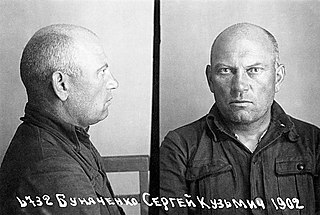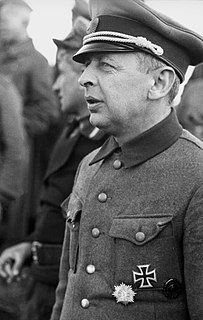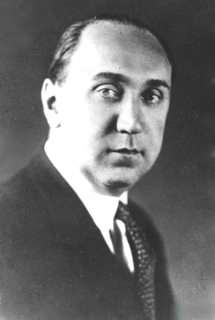 W
WLászló Bárdossy de Bárdos was a Hungarian diplomat and politician who served as Prime Minister of Hungary from April 1941 to March 1942. He was one of the chief architects of Hungary's involvement in World War II.
 W
WKároly Beregfy was a Hungarian military officer and politician, who served as Minister of Defence in the 1944–45 Arrow Cross Party government.
 W
WKai Henning Bothildsen Nielsen was a Danish national socialist who became a member of the Peter group in Denmark during the Second World War. He participated in numerous operations to murder and bomb civilians and public servants as collective punishment whenever the Danish resistance carried out an operation. Bothildsen was after the war convicted for 57 murders, 9 attempted murders and 116 sabotage events and given a death sentence which was eventually ratified by the Danish Supreme Court. He was executed on 9 May 1947 in Copenhagen.
 W
WSergei Kuzmich Bunyachenko was a Soviet Red Army defector to the German side during World War II and a major general in the anti-communist Russian Liberation Army (ROA) movement.
 W
WSemyon Trofimovich Bychkov was a Soviet military pilot during World War II. He served first in Soviet Air Forces, where he downed seventeen German aircraft, then on the opposite side. Bychkov co-founded the 1st Aircraft Regiment of the Committee of Liberation Movement of People of Russia, under the auspices of Russian Liberation Army (ROA) and was awarded the German Ostvolk Medal 2nd class with swords.
 W
WFeodor Fedorenko, or Fyodor Federenko was a war criminal serving at Treblinka extermination camp in German occupied Poland during World War II. As a former Soviet citizen admitted to the United States under a DPA visa (1949), Fedorenko became a naturalized U.S. citizen in 1970. He was discovered in 1977 and denaturalized in 1981. Subsequently, he was extradited to the USSR, sentenced there to death for treason against his nation and participation in the Holocaust, and was executed.
 W
WJózsef Gera was a Hungarian physician and politician of the Arrow Cross Party.
 W
WBronislav Vladislavovich Stroganof Kaminski was a Russian anti-communist collaborationist and the commander of the Kaminski Brigade, an anti-partisan and rear-security formation made up of people from the so-called Lokot Autonomy territory in the Nazi Germany occupied areas of Russia, which was later incorporated into the Waffen-SS as the SS Sturmbrigade RONA ]. Older publications mistakenly give his first name as Mieczyslaw. Under Kamniski's command, the unit committed numerous war crimes and atrocities in the German-occupied Soviet Union and Poland.
 W
WBaron Gábor Kemény was a Hungarian politician, who served as Minister of Foreign Affairs in the Government of National Unity led by Szálasi between 1944 and 1945. He prevented the diplomatic protests against the terror. After the fall of Budapest he tried to escape into Western Europe, but the arriving American troops captured him with other members of the Arrow Cross Party's government. He was tried by the People's Tribunal in Budapest in open sessions and sentenced to death for war crimes and high treason. Kemény was hanged in 1946 in Budapest. He was the youngest member of that Government.
 W
WDamian Kratzenberg was a highschool teacher who became head of the Volksdeutsche Bewegung, a pro-Nazi political group, in Luxembourg during World War II. He was executed after the war for collaboration with the Nazis.
 W
WWacław Krzeptowski was one of the leaders of the Goralenvolk action in Podhale during World War II. Before the German occupation he was chairman of the People's Party (SL) in Nowy Targ. In the early years of the war – as self-proclaimed Goralenführer – Krzeptowski lobbied Hans Frank in favor of his plan to establish an independent state for his ethnic group in southern Poland. This project proved to be a failure due to lack of support among the local population.
 W
WPetras Kubiliūnas was a Lithuanian lieutenant general and Chief of the Lithuanian General Staff in 1929–1934.
 W
WSlavko Kvaternik was an Croatian Ustaše military general and politician who was one of the founders of the Ustaša movement. Kvaternik was military commander and Minister of Domobranstvo. On 10 April 1941, he declared the creation of the Independent State of Croatia.
 W
WColonel General Vitéz Dezső László was a captain during World War I and general during World War II. He was executed by the People's Republic of Hungary in 1949.
 W
WAntonina Makarova was a Soviet war criminal and executioner who collaborated with Nazi Germany during World War II. From 1942 to 1943 she executed hundreds of Soviet partisans and their family members by machine gun. Makarova was caught by the Soviet KGB in 1976 and executed three years later.
 W
WKnud Børge Martinsen was a Danish officer and the third commander of Frikorps Danmark.
 W
WAnton Adriaan Mussert was a Dutch politician who co-founded the National Socialist Movement in the Netherlands (NSB) in 1931 and served as its leader until the party was banned in 1945. As such, he was the most prominent Dutch fascist before and during World War II. Mussert collaborated with the German occupation government, but was granted little actual power and held the nominal title of Leider van het Nederlandsche Volk from 1942 onwards. In May 1945, as the war came to an end in Europe, Mussert was captured and arrested by Allied forces. He was charged and convicted of treason, and was executed in 1946.
 W
WGustav von Myrdacz was an Austrian noble who was instrumental in organizing the Royal Albanian Army from the early 1920s to 1945. He was referred to in Albania as Gustav Mirdashi.
 W
WCount Fidél Pálffy de Erdőd was a Hungarian nobleman who emerged as a leading supporter of Nazism in Hungary.
 W
WAndries Jan Pieters was a Dutch war criminal and, together with Artur Albrecht, was one of the last two people to be executed in the Netherlands. Pieters served as a volunteer for Nazi Germany on the Eastern Front. When he was wounded he returned to the Netherlands and in the final months of World War II he had led a SS commando in the Netherlands, which tortured and executed resistance members and others.
 W
WLajos Reményi-Schneller was a Hungarian politician, who served as Minister of Finance between 1938 and 1945. He started his career in 1923 as the director of the Hungarian Exchange Bank. He became representative in 1935. Kálmán Darányi appointed him Minister of Finance, Reményi-Schneller held this position until the end of the Second World War. His assignment was Minister of Economic from the Pál Teleki cabinet until the Miklós Kállay administration. He pursued Germanophile politics extremely, he regularly informed the Germans about the Hungarian political developments. During his ministership Reményi-Schneller significantly furthered the country's economic delivery with his function for the Nazi Germany.
 W
WFerenc Szálasi was the leader of the Arrow Cross Party – Hungarist Movement, the "Leader of the Nation" (Nemzetvezető), being both Head of State and Prime Minister of the Kingdom of Hungary's "Government of National Unity" for the final six months of Hungary's participation in World War II, after Germany occupied Hungary and removed Miklós Horthy by force. During his brief rule, Szálasi's men murdered 10,000–15,000 Jews. After the war, he was tried and executed by the Hungarian court for war crimes and crimes against humanity committed during World War II.
 W
WDöme Sztójay was a Hungarian soldier and diplomat of Serb origin, who served as Prime Minister of Hungary in 1944, during World War II.
 W
WGábor Vajna was a Hungarian politician, who served as Minister of the Interior from 1944 to 1945.
 W
WHryhoriy Mykytovych Vasiura was originally a senior lieutenant in the Red Army who was captured during the Nazi invasion of the USSR in 1941 and subsequently volunteered for service in the Schutzmannschaft and the Waffen-SS. Vasiura's wartime activities were not fully revealed until the mid-1980s, when he was convicted as a war criminal by a Soviet military court and executed in 1987 for his role in the Khatyn massacre.
 W
WAndrey Andreyevich Vlasov was a Soviet Red Army general and Nazi collaborator. During World War II, he fought in the Battle of Moscow and later was captured attempting to lift the siege of Leningrad. After being captured, he defected to Nazi Germany and headed the Russian Liberation Army. At the war's end, he changed sides again and ordered the ROA to aid the Prague uprising against the Germans. He and the ROA then tried to escape to the Western Front, but were captured by Soviet forces. Vlasov was tried for treason and hanged.